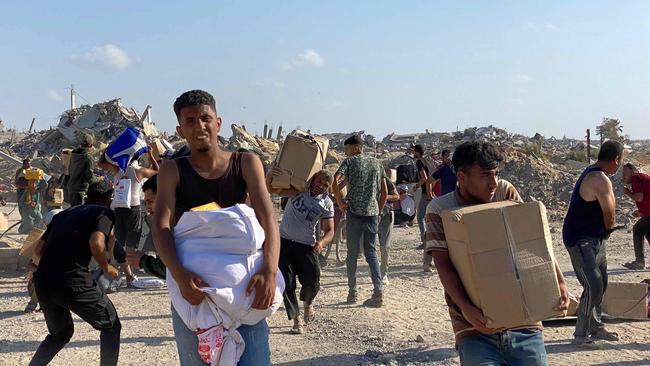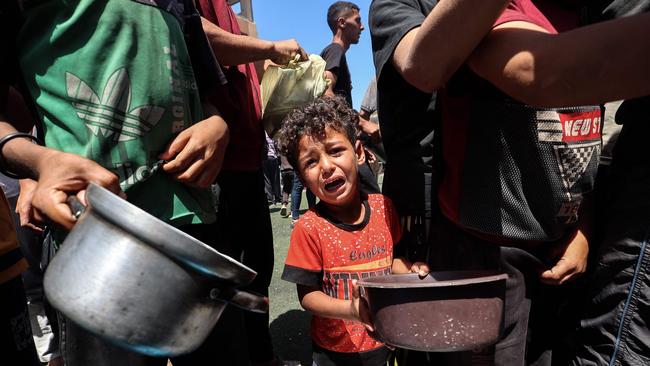Chaos, looting mar start of new aid distribution system in Gaza
The US and Israeli-backed plan aims to deliver aid directly to Palestinians through private security companies.

The launch of an Israeli-backed plan to deliver aid in Gaza through a private company erupted into chaos after thousands of Palestinians broke into the distribution site and forced its staff to retreat.
The distribution of aid began normally on Tuesday, with Palestinians lining up to receive boxes of food early in the day at a distribution centre in Rafah in southern Gaza. But the security situation changed at around 4:30pm local time when a poorly constructed gate collapsed as large crowds tried to push through the narrow entrance, witnesses said. Looting ensued, according to the witnesses, who said they heard shots fired in an effort to disperse the crowds. No injuries were reported.
The Gaza Humanitarian Foundation, which oversees the new system of aid distribution, characterised the incident as a blip in what it said was an otherwise successful launch. It had distributed approximately 8,000 boxes of food through the secure distribution site, the group said, adding that more aid would be delivered on Wednesday.
“At one moment in the late afternoon, the volume of people at the SDS was such that the GHF team fell back to allow a small number of Gazans to take aid safely and dissipate,” GHF said in a statement. “This was done in accordance with GHF protocol to avoid casualties,” it added.
The Israeli military said it fired warning shots outside the distribution compound.
The scenes of chaos mark another, early setback for the new Israeli-backed plan to deliver aid in Gaza. On Monday, GHF’s chief executive, Jake Wood, had resigned.
The plan has been touted by Israeli Prime Minister Benjamin Netanyahu as a solution for stopping Hamas from taking control of aid, something the US-designated group denies that it does. According to the plan, food is supposed to be handed out directly to Gazan families through designated distribution centres with the help of private US security firms.
The US and Israel backed plan, which effectively overhauls the way aid entered Gaza since the start of the war, faced criticism from European states and aid groups. The United Nations says the system contradicts its principles of neutrality and puts civilians at risk. Safe Reach Solutions, the private security company overseeing the operation, has faced criticism for being understaffed and ill-prepared for such a complicated task. Safe Reach Solutions didn’t immediately respond to a request for comment.
The Israeli military said on Tuesday that two of four planned distribution centres in Rafah began operating.
The Hamas-controlled Government Media Office in Gaza said that Israel’s aid distribution plan had collapsed, calling it a “resounding failure” amid the chaotic scenes.
Gazans who arrived early at the site were able to get their hands on boxes of food without any screening, witnesses said. Those who came later were less lucky.
“Unfortunately, when my turn came, the chaos started,” said Khadir Abu Dayyah, 43, a father of eight children, who slept near the distribution area three days in advance.

When the compound was overrun and looting began, he was able to grab a box consisting of sugar, flour, two cans of fava beans and a can of tomato sauce. He ended up giving the flour to an elderly woman who asked for it, he said. “A human becomes a beast when he hasn’t eaten,” Abu Dayyah said.
He said that his family had warned him not to go to the distribution centre because the area is dangerous, but he went anyway in order to feed his family.
“I have no other choice — I have to feed my kids,” he said.
Amid growing international pressure, Israel allowed aid back into Gaza after a more than two-month blockade on the enclave that it said was aimed at pressuring Hamas to release the hostages. A global hunger watchdog, the Integrated Food Security Phase Classification partnership, said earlier this month that nearly half a million people in Gaza already face starvation.
“The UN has raised concerns that the proposed model cannot deliver aid effectively, at the speed and scale required,” read a statement by the foreign ministers of 22 countries including France, Japan, Canada, Germany and the European Union on May 19, criticising the new Israeli-backed aid plan.
“It places beneficiaries and aid workers at risk, undermines the role and independence of the UN and our trusted partners, and links humanitarian aid to political and military objectives,” the statement said.






To join the conversation, please log in. Don't have an account? Register
Join the conversation, you are commenting as Logout